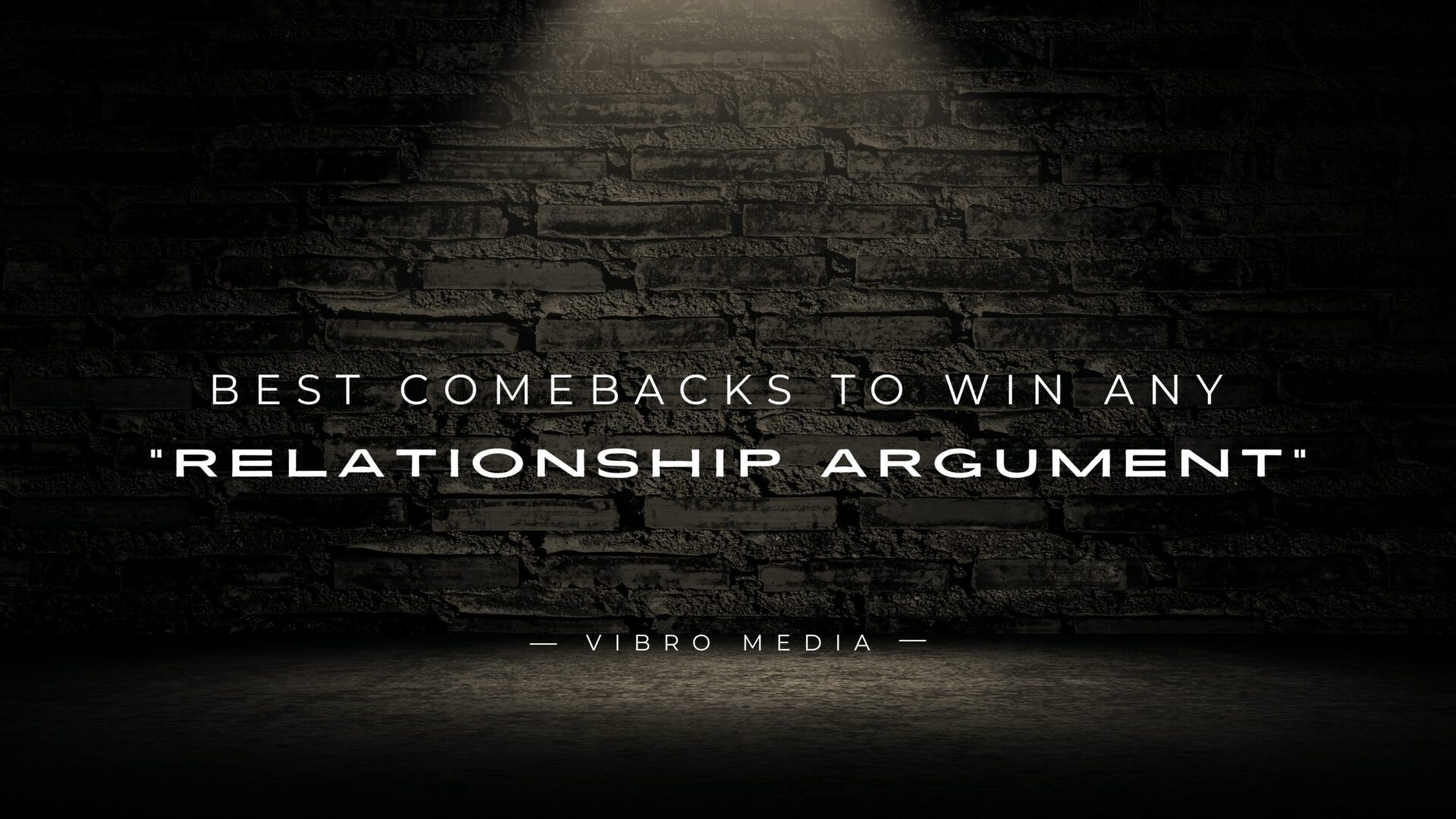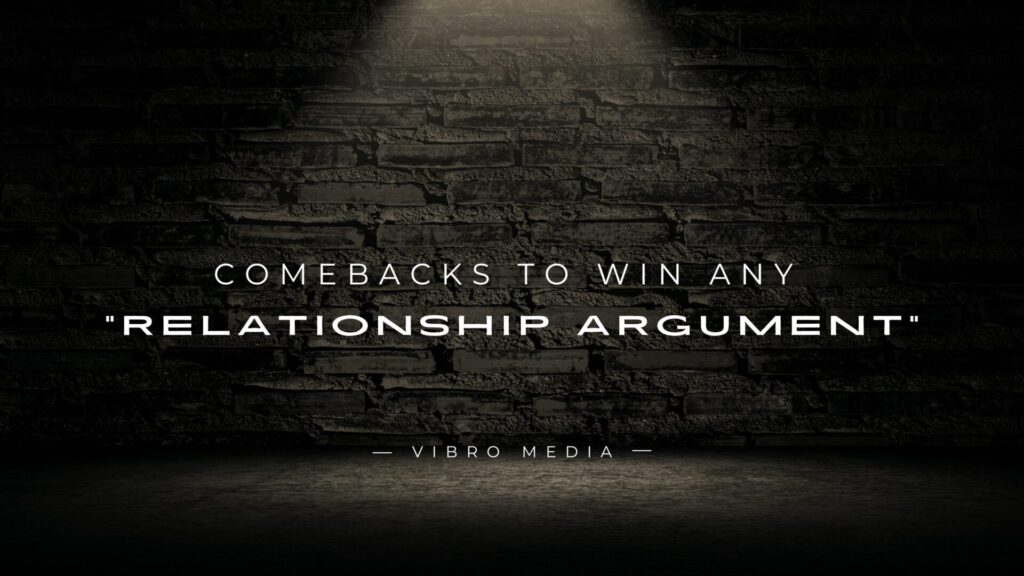200+ Best Comebacks to Win Any “Relationship Argument”

Arguments in relationships are inevitable. Whether it’s about minor disagreements or more profound issues, knowing how to handle these conflicts is essential for maintaining a healthy connection. Responding to relationship arguments can strengthen the bond or create a rift. In this guide, we’ll walk through practical strategies to effectively manage and respond to a “relationship argument,” ensuring that you and your partner emerge stronger from each conflict.

200+ Comebacks for “Relationship Argument”
Sarcastic Comebacks
- I didn’t realize we were auditioning for a reality TV show!
- Yeah, because yelling louder always solves everything.
- I’ll win if we play ‘Who’s Right’ today.
- Oh great, another ‘perfect relationship’ lesson from you.
- Let me grab my notebook to take notes on this profound wisdom.
- Of course, let’s argue over something that doesn’t even matter in the grand scheme of life.
- Yeah, because no one ever wins an argument with you.
- I’m sure this will end well if I just agree with everything you say.
- Are we still arguing, or did we switch to a new Drama 101 episode?
- Wow, you should start a podcast about everything I’m doing wrong.
Humorous Comebacks
- If we keep arguing like this, we will need a lawyer soon.
- Well, this is fun. Do you want to call it a draw and get some pizza?
- Oh good, my favorite hobby is trying to understand your logic.
- If I say, ‘You’re right,’ can we end this now?
- Let me grab my popcorn; this is getting interesting.
- Should we be taking bets on who’s going to break first?
- Are we doing the argument marathon, or is this the sprint version?
- We need a timeout… or maybe just a snack.
- Why are we fighting when we could be out having fun? Let’s flip a coin!
- Let’s get a referee in here; this is turning into a full-on sports event.
Calm and Collected Comebacks
- I understand you’re upset, but let’s step back and discuss this.
- We must both take a breath and listen to each other.
- Let’s not let this moment define our relationship. Let’s focus on resolving this.
- I hear what you’re saying, and we both need space to think clearly.
- We’re both angry, but we can discuss this without raising our voices.
- I see where you’re coming from, but can we focus on finding a solution?
- This is important to me, so let’s address it calmly and find common ground.
- We’ve been through more challenging things together, and I know we can work this out.
- I don’t want to fight; I want to fix this with you.
- Let’s take a moment, regroup, and come back with a clearer mind.
Playful Comebacks
- Are we fighting, or are we just rehearsing for a soap opera?
- I’m winning this argument if this is a competition, just FYI.
- Okay, let’s settle this like adults: rock-paper-scissors.
- Wow, someone’s been taking relationship drama lessons!
- I didn’t sign up for this, but if I did, I’d at least expect a reward at the end.
- Let’s just agree to disagree and have ice cream instead.
- I thought we were having a friendly debate, not preparing for battle!
- Is it too late to change my mind and just agree with you?
- Can we take a timeout for a dance-off instead?
- I love your passion, but can we switch to something less intense?
Emotional and Understanding Comebacks
- I know you’re upset, and I’m here to listen to what you have to say.
- I didn’t mean to hurt you, and I genuinely want to understand how you’re feeling.
- I can tell this matters a lot to you, and I’m trying to understand your perspective.
- I care about you, so I want to work through this together.
- I see how this situation upset you, and I want us to move forward as a team.
- It’s essential that we both feel heard and respected in this argument.
- We’re both emotional right now, but we can fix this if we stay open to hearing each other.
- I might not completely understand, but I’m open to listening and learning.
- I value our relationship too much to let this disagreement linger. Let’s talk it out.
- It’s okay to be upset, but I want to understand why this matters to you.
Defensive Comebacks
- I’m not saying you’re wrong, but I don’t appreciate how you talk. I’m just trying to express myself, and it feels like you’re shutting me down.
- I’m not perfect, but I’m doing my best, and I need you to see that.
- You’re upset, but you’re not even listening to my side.
- I’m not trying to make excuses, but I have my reasons for doing that.
- I didn’t intend to hurt you, and I wish you would understand that.
- No matter what I say, you’ll just focus on what I did wrong.
- I’m doing my best to make things right, but I need you to acknowledge my effort.
- I get it. Can we understand that I’ve done well, too?
- I understand your frustration, but I don’t think you’re being fair to me.
Reassuring Comebacks
- I know things are tough right now, but I promise we’ll get through this together.
- I’m not going anywhere. We can work through this as a couple.
- I believe in us; we’ve faced challenges before and become stronger.
- This argument doesn’t change how much I care about you. We’ll find a way to fix this.
- I know weWe’ressroads, but I believe we’ll resolve it.
- We’ve b it iteen through rough patches, but I know we can move forward from this one.
- We’ll figure this out, I promise. Let’s not lose sight of our love for each other.
- I believe we’re stronger together and come out of this even better.
- I want us to be happy and willing to do whatever it takes to get there.
- You’re not alone in this; I’m right here with you.
Empowering Comebacks
- We both must stand up for our beliefs and listen to each other.
- I understand your point and want to find a way to make sure my feelings are heard, too.
- Let’s work together to solve this, not just focus on who’s right.
- I’m not afraid to speak my truth, but I’m willing to hear yours.
- I want us both to feel like we’re together as equals.
- Both of our opinions matter in this relationship.
- We deserve to have our voices heard, so let’s find a way to communicate better.
- I can’t change the past, but I am committed to improving things.
- I believe in us, but we both need to work on how we communicate.
- We have the power to fix this, but we both need to put in the effort.
Neutral and Solution-Oriented Comebacks
- Let’s put aside our differences for a moment and figure out what we can do to fix this.
- We need to focus on a solution, not just the problem. What can we both do to move forward?
- We’re both upset, but let’s find a way to work through this together.
- We’re not going to solve this by arguing. Let’s take a moment and come up with a plan.
- We should both take some time to think and then talk about how to move forward.
- What is the best solution here? I’m open to ideas.
- Let’s devise a way to compromise so we both feel heard.
- We can get past this, but we must stay focused.
- I’m not interested in being right; I just want us to be happy and find a way to solve this.
- Let’s agree to pause, think things over, and then reconvene to work on a solution.
Direct and Assertive Comebacks
- I’m not going to keep arguing in circles. Let’s focus on finding a solution.
- I’m stating my feelings clearly, and I expect you to listen without interrupting.
- We need to be able to take responsibility for what happened, not just blame each other.
- We must talk about this calmly, or I’ll have to walk away until we’re both ready.
- I’m not backing down; I’m keen to hear your side.
- I’ve said my piece; now it’s your turn to listen and respond thoughtfully.
- We’re not going to solve anything by yelling. I suggest we calm down and talk.
- I understand you’re upset, but I won’t accept being treated like this.
- This is not about winning or losing but understanding each other.
- Let’s cut to the chase and address what’s bothering us.
Irony and Humor Comebacks
- I didn’t know we were competing for the ‘Most Dramatic Argument’ award.
- Oh, great! Another argument about the same thing. What are we in a soap opera?
- I’m glad we’re arguing because who needs peace when we can have this level of excitement?
- I’m starting to enjoy this. Is there a prize for arguing the longest?
- This argument is so much fun; I almost wish we had more of them.
- I get it now: we’re just preparing for an argument marathon!
- Wow, this is the highlight of my day.
- Well, if this were a competition, I’d say I’m ahead right now.
- Okay, let’s just call it a tie. We both win… and lose!
- If I had a dollar for every time we argued, I could buy a vacation from all this drama.
Guilt-Inducing Comebacks
- I can’t believe you’re treating me like this when all I’ve ever wanted was to make things work.
- You wouldn’t talk to me like that if you cared about me.
- I thought we were a team, but now you’re attacking me.
- You always say you love me, but your actions don’t match your words.
- I’m doing my best to make things right, but it feels like you’re not even trying.
- I don’t deserve to be treated like this after everything I’ve done for us.
- I never thought we’d get to this point where we can’t even talk things through.
- This is hurtful, and I can’t believe it’s coming from someone I care about.
- It hurts that you don’t see how much I’m trying to make this work.
- I’m trying so hard to improve things, but it feels like you don’t care.
Pessimistic Comebacks
- Maybe we’re not meant to be together if we keep arguing like this.
- This will stay the same no matter how much we try.
- At this point, I’m starting to think we’re just wasting our time.
- Maybe we’re just too different to make this work long-term.
- We’re stuck in the same argument forever and never getting anywhere.
- I’m starting to wonder if this relationship is worth all the constant fighting.
- Every time we argue, I feel like we’re drifting further apart.
- I don’t know if we can fix this. It feels like we’re always in the same cycle.
- Maybe the problem is more significant than we realize, and we’re both too blind to see it.
- I don’t see how we can get past this. It seems like we’re just too broken to fix.
Acknowledging Mistakes Comebacks
- I know I messed up, and I’m sorry for hurting you.
- I should have handled that better, and I regret how I acted.
- You’re right; I made a mistake. Let me make it up to you.
- I can see where I went wrong and will do my best to fix it.
- I take responsibility for my actions, and I’m genuinely sorry.
- I didn’t mean to hurt you, and I understand why you’re upset.
- I shouldn’t have said that, and I wish I could take it back.
- I know I didn’t handle that well and I want to make things right between us.
- I made a mistake, and I can see how that upset you.
- I’ve reflected on what I did and am sorry for causing you pain.
Disengaging Comebacks
- I don’t think we will get anywhere by continuing this right now. Let’s take a break.
- I’m too emotional to have this conversation right now. Can we talk later?
- This conversation is going in circles, so I’m stepping back momentarily.
- I’m not doing this right now. Let’s cool off and come back to it.
- I don’t want to say something I’ll regret so that I will walk away.
- We won’t resolve this by arguing now, so let’s take some space.
- I think it’s best if we take time apart to think things over.
- I need to step away from this conversation to clear my head.
- Let’s take a break from this discussion before it gets worse.
- I’m not in the right headspace for this conversation, so I’ll be back when I am.
Reflective Comebacks
- Let’s step back and consider why we’re arguing about this.
- Maybe we should take a moment to reflect on how we’re both feeling before we continue.
- I need to think about how I can approach this better in the future.
- This argument is about more than just the issue at hand. Let’s figure out what’s going on.
- We both need time to reflect on our actions before moving forward.
- I’ve been thinking about our argument and seeing what could improve things. It’s not just about what happened but about how we communicate.
- We both need to reflect on what we want out of this relationship.
- This argument isn’t just about the topic. It’s about how we’re communicating and handling our emotions.
- I’ve realized I must also take a deeper look at my behavior.
Complimenting Comebacks
- I appreciate how passionate you are about this. I can see how much you care.
- I admire your strength in standing up for what your buyout disagrees with.
- I respect your opinion, and I want to understand it better.
- You always know how to express your thoughts clearly, even if I don’t always agree.
- I love how deeply you care about us. It makes me want to work harder at this.
- I know we’re in an argument, but I just want to say I’m thankful for everything you do.
- I appreciate your being open with me, even though this conversation is challenging.
- Difficult discussions are challenging, but I admire your willingness to keep talking.
- You’re good at making your point, and I value your perspective.
- I may disagree, but I always appreciate your honesty and courage.
Philosophical Comebacks
- Every relationship goes through tough times. It’s how we handle them that matters.
- This argument may be an opportunity for us to learn and grow together.
- Conflict is inevitable, but how we choose to resolve it defines us.
- This won’t matter as much as we think in the grand scheme of things.
- Disagreements are a part of life, but how we respond shapes the future.
- This is just a moment in time, and our reactions to it will determine how we move forward.
- The key to a lasting relationship isn’t avoiding conflict but learning how to handle it.
- Sometimes, we must go through discomfort to reach understanding and growth.
- Every challenge we face together makes us stronger as a couple.
- Relationships are not about being perfect but about learning and adapting together.
Nonchalant Comebacks
- I’m not going to stress about this. We’ll figure it out eventually.
- It’s not the end of the world. We can talk when we’re both ready.
- I’m not too worried about this; it’ll work itself out.
- We don’t have to fix everything right now. Let’s just take it easy.
- We can talk later when we’re both in a better mood.
- This doesn’t seem as important as it feels right now. Let’s just relax for a bit.
- It’s okay; we’ll get through this. There’s no need to make a big deal out of it.
- Let’s drop it for now and return to it when we’re calmer.
- I’m not going to let this ruin my day. Let’s take a break.
- I’m not stressing over this; let’s discuss it when we feel better.
Resigned Comebacks
- I guess we’ll keep going in circles, won’t we?
- It feels like nothing will change, no matter what we say.
- I don’t know how to fix this anymore. Maybe we just aren’t meant to be.
- This may be the way things are going to be between us.
- I’m tired of arguing, but I don’t know. I don’t correct this.
- I’ve tried everything and don’t know what else to do.
- Maybe it’s time to accept that we’re just not seeing eye to eye.
- I don’t know if we’ll ever get past this. Maybe it’s time to let go.
- At this point, I’m not sure there’s any point in continuing this argument.
- No matter what we do, we will never agree.
Understanding the Nature of a Relationship Argument
- What is a Relationship Argument?
A relationship argument occurs when two people disagree, usually on something that matters deeply to them. It’s more than just a simple difference in opinion; it’s often charged with emotion, making it feel overwhelming and challenging to challenge; disagreements are normal in any relationship—they’re part of growing and understanding each other.
- Common Causes of Arguments in Relationships
Arguments don’t usually come out of nowhere. There are common triggers that can lead to disputes, such as:
Communication gaps: Misunderstandings or not feeling heard can fuel frustration.
Differing expectations: When partners have different views on important topics like finances, intimacy, or future goals.
Stress and external factors: Outside pressures like work stress or family issues can spill over into the relationship, causing tension.
- Emotional Reactions During Arguments
When emotions run high, it’s easy to react impulsively. The fight-or-flight response can kick in, making us lash out or shut down. Recognizing this natural response can help you slow down and handle the situation more thoughtfully.
The Importance of a Calm Approach
Staying calm during a relationship argument is vital because it prevents the conversation from escalating. When you’re relaxed, you can think more clearly, allowing you to understand the situation better and respond constructively. A quiet approach also signals emotional maturity, showing your partner you’re invested in resolving the conflict, not just winning the argument.
- Techniques to Stay Calm During Arguments
Deep breathing exercises: Simple deep breaths can help regulate your nervous system and reduce the intensity of your emotions.
Pause and reflect: Before responding, take a moment to process your thoughts. This helps prevent knee-jerk reactions that may worsen the argument.
Listening Actively to Understand, Not to Reply
- The Power of Active Listening
Active listening means genuinely focusing on what your partner is saying, not just waiting for your turn to talk. Listening to understand rather than reply makes you less likely to misunderstand each other, which can significantly defuse tension. Active listening builds empathy, showing your partner you value their feelings and perspective.
- Techniques to Improve Active Listening
Maintain eye contact: This shows your partner they have your full attention.
Rephrase and validate: Paraphrase your partner’s words to confirm you’ve understood correctly. For example, “It sounds like you’re frustrated because…”.
Avoiding Blame and Accusations
- Why Blame is Harmful
Pointing fingers during a relationship argument rarely leads to a solution. Blame shifts the focus away from solving the issue and onto defending oneself. This creates a cycle of defensiveness, where neither person is willing to budge.
- Using “I” Statements Instead of “You” Statements
Rather than saying, “You never listen to me,” which can feel like an attack, try, “I feel unheard when I talk about my day.” This shifts the focus from what your partner is doing wrong to how you feel, making it easier for your partner to empathize with your perspective.
Expressing Your Feelings Honestly and Respectfully
- Why Honesty is Important in Arguments
Being honest about how you feel during an argument is crucial. Hiding your true feelings only leads to unresolved issues and festering resentment. Honesty fosters trust, even during conflict, because it ensures both partners are aware of what’s truly going on.
- How to Be Honest Without Being Hurtful
Honesty doesn’t mean being brutally frank. It’s important to express yourself in a way that is sensitive to your partner’s feelings. For example, instead of saying, “You’re selfish,” try, “I feel like my needs aren’t being considered right now.”
Finding Common Ground and Compromise
- What is Compromise in a Relationship?
Compromise is about finding a middle ground where both partners feel satisfied. It’s not about one person winning and the other losing; it’s about flexibility and mutual respect. Compromise shows you’re willing to make the relationship work, even when it’s tough.
- Steps to Reach Compromise
Identify mutual goals: Focus on what both of you want from the situation.
Understand each other’s perspective: Try to see the issue from your partner’s point of view before proposing solutions.
Avoiding the Silent Treatment
- Why the Silent Treatment is Toxic
Giving your partner the silent treatment during or after an argument is one of the most destructive behaviors. It blocks any chance of resolving the issue and creates an emotional distance that can be hard to overcome. Over time, it breeds resentment and hurts the foundation of the relationship.
- Healthier Alternatives to Silence
If you need a break, clearly communicate that you need time to cool down and will return to the conversation later. This gives both partners the space to reflect without feeling abandoned or punished.
Apologizing and Making Amends
- The Importance of a Genuine Apology
A genuine apology can heal emotional wounds and rebuild trust after a relationship argument. It shows your partner that you value the relationship and are willing to take responsibility for your role in the conflict.
- How to Apologize Sincerely
A sincere apology involves acknowledging what you did wrong, expressing regret, and offering a plan to prevent it from happening again. Simply saying, “I’m sorry,” isn’t enough—you need to show that you understand the impact of your actions and are committed to change.
Learning from the Argument for Future Growth
- Reflecting on the Argument
After the dust has settled, take some time to reflect on the argument. What triggered the disagreement? Were there any patterns in your behavior or that of your partner that contributed to the conflict?
- How to Prevent Similar Arguments
Improving communication, practicing emotional regulation, and understanding each other better can all help prevent future arguments from escalating into serious conflicts.
When to Seek Professional Help
- Signs It’s Time for Couples Therapy
If you find that arguments are becoming more frequent and intense or that you’re unable to resolve issues on your own, it may be time to consider couples therapy. Therapy can provide tools to help break unhealthy patterns and improve communication.
- How Therapy Can Help
A therapist can help both partners learn to communicate more effectively, resolve deep-rooted issues, and build a stronger emotional connection.
Conclusion
Navigating relationship arguments can be tricky, but having thoughtful and practical comebacks can make all the difference. The correct response helps diffuse tension and allows communication and understanding between you and your partner. Remember, it’s not just about “winning” the argument but resolving the conflict in a way that strengthens your relationship. If you’re looking for more ways to handle difficult situations, check out our 200+ Best Comebacks for “Body Shaming” Quick Guide Here for intelligent responses to another sensitive issue. Assertive communication is critical in a relationship or responding to challenges like body shaming.
FAQs
Q. What is the best way to calm down during an argument?
Taking deep breaths and pausing to collect your thoughts can help you stay calm. Focusing on the issue is essential rather than letting emotions take over.
Q. How do I express my feelings without starting another argument?
Use “I” statements to express your feelings without blaming your partner. This reduces defensiveness and opens up space for constructive conversation.
Q. Should we take breaks during heated arguments?
Yes, taking a break can be helpful if emotions are too high. Just ensure you communicate that you’ll return to the conversation later.
Q. What should I do if my partner refuses to communicate?
Encourage open dialogue by creating a safe and non-judgmental space for conversation. If communication remains an issue, couples therapy might be beneficial.
Q. When should we consider couples therapy?
If arguments become frequent, intense, and unresolved, or if communication consistently breaks down, couples therapy can help restore harmony and understanding.






